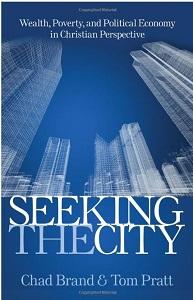
Book Review by Randall Wallace, Ph.D.
One of the greatest tensions that exists intellectually for followers of Christ, who seek to live out a Biblical worldview on a daily basis, is how this affects our economic and political life. How do we translate Biblical values in the marketplace and town hall? Politics and economics are interwoven, each affecting the other. Historically, religious bodies have been involved in analyzing and defining the responsibilities of their followers in each realm.
Chad Brand and Tom Pratt take the reader on a journey that examines this interwoven thread in their book, Seeking the City: Wealth, poverty, and political economy in a Christian perspective. They undertake a gargantuan task of examining how the universal church has sought to live out Biblical values economically and politically throughout history. In one sense it is like taking a helicopter that makes periodic stops through history and provides a quick overview of how religion, politics and economics are expressed in that era and who the major minds are directing thought and praxis.
The book begins with an examination of the Bible narrative of how God expects people to live in the world. Beginning with Genesis and moving through the Pentateuch and prophets, the author’s helicopter makes periodic stops providing analysis of the role of leaders in directing politics and economics. This continues through the New Testament examining how the church universal has tried to apply what they understood to be God’s instruction as to how they relate to government and practiced economics (though they didn’t call it that) in daily life. The authors take pains to avoid entangling their analysis in modern day “isms” that usually define both politics and economics. This is no small feat and provides a valuable look at some fairly common stories in Scripture, pulling from them principles often overlooked due to the “ism” lens that can blind anyone wearing those particular glasses. Their analysis also takes into account humankind’s rebellion against God and how that is expressed in terms of personal character, political expression and economic function. They juxtapose two kingdoms in conflict and as a result look at the fields of politics and economics as possessing not only fruitful ideas consistent with God’s original purposes, but also tares, often threatening the very health and fruitfulness of the field.
The ride continues through history, following the development of economic and political thought in the Western world through the time of Rome, Geneva, the reformation, French and English mercantilism, the American experiment and the rise of free market capitalism. In each era it pauses to examine its thinkers. The reader gains brief overviews of how and what Aristotle, Tertullian, Augustine, Aquinas, Luther, Calvin, Zwingli, Hutter, Simons, Locke, Hobbes, Hume, Smith, Montesquieu thought about the role of government and the expression of economics in daily life. And these are but a few of those covered.
The final section of the book leads the reader through the complexities of morality and economics, social justice and the distribution of wealth, the American Dream versus God’s intentions for humankind, competition and hyperindividualism versus community and interdependence. What is explored is not subject to quick or superficial categorization into the polar political and economic dichotomies so readily applied today. The authors seek a fair and accurate application of Biblical insight and principles, unsullied by dominant ideologies. It will not be fully satisfactory for either liberal or conservative readers if they seek full justification of their position. Such is the nature of Biblical truth. It is often in opposition to the ideas of humans.
This is not a quick read. It is over 800 pages of observations that shed light on how believers have struggled to take their faith seriously in how they live related to economy and how that affects their political views. It serves as an excellent introduction to the task at hand and the reader will come away with a broader and more in-depth understanding of the nature of political thought and economics as it relates to living out God’s intentions in the world. It serves as a primer and reference to other writers who go much more in-depth in their analysis. Too often thinkers such as Friedrich Hayek, Milton Friedman, Thomas Sowell, John Keynes, or Reinhold Niebuhr are not brought into consideration when examining how we relate to wealth and politics even though their ideas may be shaping our thought without us even knowing it. Bringing these ideas to the forefront and enabling the reader to become familiar with them in order to evaluate their suitability is valuable.
What I found troubling, throughout the historic section, was how teachings in the church tended to mirror the spirit of the age. The dominant political or economic ideologies of a time had direct affect on teachings in the church relating to the use of wealth or the nature of politics or economics. There were some exceptions where particular small groups sought to live differently from or apart from the mainstream of society. They were seen to be fringe movements both politically and spiritually. Seldom, particularly in what could be called the modern era, did one find key leaders or scholars within the Christian tradition who provided an alternative, firmly anchored to biblical truth, to systems built on power or materialism (this also embraces Marxism) who had any standing or voice in the mainstream. There are and were voices but they are often tainted by the spirit of the age emphasizing one or more secular camps of thought.
Each historic section became a challenge to one or more of my long-held beliefs concerning wealth, economics or politics. Having personally worked to bring about transformation among poor populations for over 30 years, I found some of my cherished ideas proven inadequate or in conflict with the grand narrative outlined by the authors in the first third of the book. An example relates to personal responsibility.
Personal responsibility is one of the key concepts the authors identify in their analysis of a Biblical narrative on economics and wealth. They develop this idea and use it as a means of evaluation throughout the book looking at each era’s attempts to operationalize a Biblical ethic. There is ample support throughout scripture for personal responsibility and how lack of it contributes to poverty. What is interesting is how often this idea is overlooked, especially in modern approaches to poverty elimination. The authors refer to key voices in our current age such as Sider or Campolo and point out how their assessments of wealth and poverty often overlook one of the key reasons for poverty: lack of personal responsibility. This was one of the most crucial lessons I had to learn over the course of my involvement in ministry to the poor. In my early years, I had framed poverty solely in the context of the poor being victims of exploitation, oppression or the faulty distribution of wealth. As I labored over time, I began to realize many of their problems arose from poor choices and chronic sin. I would have spent my early years much differently had I fully grasped this concept earlier.
Another area I found beneficial was the section discussing social justice and economic decision making. Their analysis of where the concept originated and how it is evolving is extremely valuable. With the rise of modern emphasis on income equality, redistributive strategies, and the role of the state in addressing poverty, the authors provide needed perspective drawing on not only progressive or liberal writings but those of conservative intellectuals as well. They caution those seeking social justice through the state to be aware that the tendency is toward totalitarianism and yet agree that how a state uses its resources involves moral choices. These issues are dealt with throughout the book and the reader comes away with a broader and more balanced perspective since the authors take pains to be even-handed in their analysis.
Some will find this book troubling since it does not take the popular tack of demonizing capitalism. Some will find it troubling because it does not fully embrace unrestrained capitalism or unregulated markets. What it seeks to do is to find the truth in a complex ever-changing economic and political reality. Though one may not agree with all the author’s conclusions, one will come away with a more complete understanding of the complexity of the issues and a historic understanding that ideas have consequences, often unintended.





